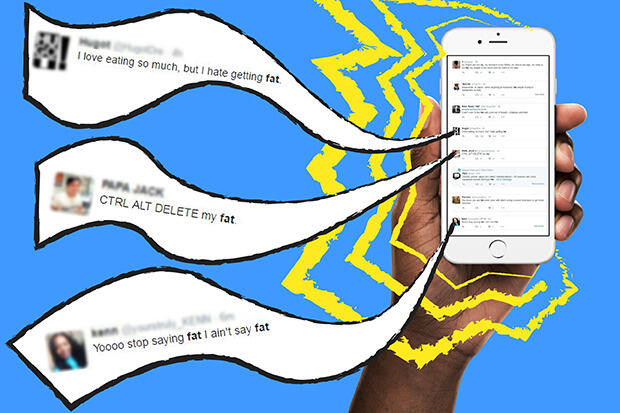
April 18, 2016
Does this tweet make me look fat? New study explores weight stigmatization on Twitter
Share this story
A new study by researchers at Virginia Commonwealth University, Yale School of Medicine and American University has found that weight stigma — or negative attitudes about people simply because they are overweight — is occurring regularly on Twitter.
The researchers compiled a database of 4,596 tweets that contained the word “fat” over a four-hour period and then used a rigorous content analysis strategy to characterize and analyze patterns in the tweets, thereby providing a glimpse into what kinds of messages about weight can commonly be found on Twitter.
They found that of all the tweets containing the word “fat,” 56.6 percent were negative and 32.1 percent were neutral. Of the tweets the researchers identified as containing weight-stigmatizing messages, they found themes relating to fatness that included: gluttonous (48.6 percent), unattractive (25.1 percent), not sexually desirable (2.7 percent), sedentary (13.8 percent), lazy (5.9 percent) and stupid (4.2 percent).
The most important finding for this study is that weight stigma happens on Twitter — with many of the same themes as other forms of media.
“The most important finding for this study is that weight stigma happens on Twitter — with many of the same themes as other forms of media,” said Janet Lydecker, Ph.D., who collected the data while she was a doctoral student at VCU, and who is now a postdoctoral associate in psychiatry at Yale. “This is important because Twitter is very popular, particularly among adolescents and young adults who are vulnerable to internalizing weight-stigmatizing attitudes and developing disordered eating. It is also important because Twitter has a social element that makes cyberbullying possible.”
The study, “Does this Tweet Make Me Look Fat? A Content Analysis of Weight Stigma on Twitter,” will appear in an upcoming issue of the journal Eating and Weight Disorders – Studies on Anorexia, Bulimia and Obesity. It was published online this month.
The researchers found women were more likely to be the subjects of tweets that had the word “fat,” and that weight-stigmatizing attitudes about attractiveness or sexual desirability were more likely to target women than men.
“Again, this is important because young women are a vulnerable group for developing disordered eating,” Lydecker said.
The researchers decided to launch the study because weight stigma in other forms of traditional media, such as TV news, did not appear to have the same influence on young people as new media, such as Twitter, and little scholarly research had been conducted into weight stigma on the social media platform.
“Our purpose was to describe what kind of messages are out there, so additional research needs to look at the impact of these messages on young adults, and see if thinking about Twitter as an important social environment could help improve health prevention and intervention work,” Lydecker said.
Suzanne Mazzeo, Ph.D., a professor in VCU’s Department of Psychology in the College of Humanities and Sciences who researches eating disorders and obesity, also was involved in conducting the study.
“When it comes to weight stigma on social media sites like Twitter,” Mazzeo said, “it’s important for people remember that, just like all media, it promotes unrealistic images, often with the purpose to sell something.”
“On social media, people are cultivating a self-image which might not have anything to do with their real image,” Mazzeo said. “Our bodies do great things for us and we should focus on what our bodies can do, rather than what they look like.”
Subscribe to VCU News
Subscribe to VCU News at newsletter.vcu.edu and receive a selection of stories, videos, photos, news clips and event listings in your inbox.








